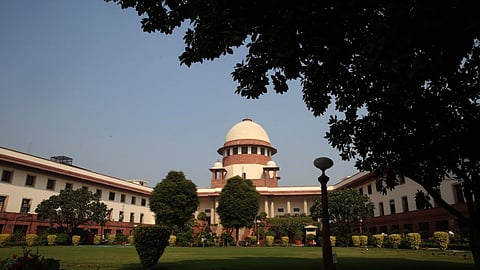

NEW DELHI: The Supreme is scheduled to hear Delhi Chief Minister Arvind Kejriwal's plea challenging his arrest by the CBI in connection with the Delhi excise policy case, where he was being currently probed by the agency in the case.
A two-judge of the apex court, led by Justice Surya Kant and Justice Ujjal Bhuyan is scheduled to hear Kejriwal’s plea on August 14, Wednesday.
It is pertinent to note here that Kejriwal was already granted bail by the apex court on July 12, in the same case. He was arrested by the CBI on June 26 in the case.
Senior lawyer, Abhishek Manu Singhvi and Chander Uday Singh, appearing for Kejriwal, had on Monday mentioned the matter for an urgent listing of the petition before the CJI-led bench. To this, the CJI D Y Chandrachud asked the lawyers to send an email request, so that he could go through it and list the matter for a hearing.
Kejriwal in his plea had termed his "arrest by the CBI as illegal" and sought quashing it.
Singhvi said that mylords 3 bail orders under section 45 of PMLA, and this a bail which is without Section 45. To this, the CJI said, "Email it, I will look at it."
On July 12, the Supreme Court in its verdict released him on interim bail in the Delhi excise case, as it said that Kejriwal had suffered incarceration for more than 90 days, and is also an elected representative, while granting him interim bail.
On August 5, the Delhi High Court upheld the arrest of Chief Minister Arvind Kejriwal by the Central Bureau of Investigation (CBI) in connection with the alleged excise policy scam. This decision marks a severe blow to the Aam Aadmi Party (AAP) leader's efforts to challenge the arrest.
Justice Neena Bansal Krishna, presiding over the case, dismissed Kejriwal’s plea contesting his arrest, stating that it was conducted with justifiable reason. Alongside this, the court disposed of Kejriwal's bail plea, advising him to seek relief from the trial court.
The HC had reserved its verdict on July 17 regarding Kejriwal’s challenge to his arrest by the CBI and on July 29 regarding his bail plea after hearing arguments from both Kejriwal’s counsel and the central agency.
The HC in its judgment noted that it has been further explained that the petitioner is not an ordinary person but it is the Chief Minister of NCT of Delhi and the convener of AAP, which has its Government in Punjab.
“There were links of this crime even in Punjab but the material witnesses were not forthcoming for the simple reason of the influence exercised by the petitioner, by his position. It is only when he was arrested that the witnesses from the Punjab came forth to get their statements recorded and, two of those witnesses, turned approver against the petitioner,” it read.
The court also observed that the argument of the Special Public Prosecutor has merit.
“It is correct and true that the petitioner herein is not an ordinary citizen of this country but is a distinguished holder of the Magsaysay Award and a convenor of AAP. The control and the influence which he has on the witnesses is prima facie borne out from the fact that these witnesses could muster the courage to be a witness only after the arrest of the petitioner, as highlighted by the learned Special Prosecutor. Also, it establishes that the loop of evidence against the Petitioner got closed after collection of relevant evidence after his arrest. No malice whatsoever can be gathered from the acts of the respondent,” the judgment read.
While dismissing the bail plea, the court in its order said that it is more in the benefit of the petitioner, considering the complexity and the web of the facts and the material on record, to comprehensively determine the role of the petitioner in this alleged conspiracy to determine if he is entitled to bail.
“It may also be noted that when the bail application was filed before this Court, the charge sheet had not been filed. However, in the changed circumstances, when the charge sheet has already got filed before the learned Special Judge, it would be in the benefit of the petitioner, to first approach the Court of Sessions Judge,” the order read.
Kejriwal was taken into CBI custody on June 26 while he was already in judicial custody at Tihar Jail for a related money laundering case filed by the ED. Initially arrested by the ED on March 21, Kejriwal was granted bail by the trial court on June 20 in the money laundering case. However, the high court stayed this order. On July 12, the Supreme Court granted him interim bail in the money laundering case.